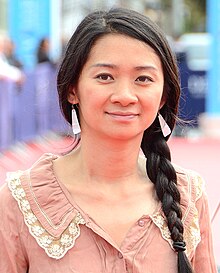Chloé Zhao
Appearance

Chloé Zhao (born Zhao Ting, March 31, 1982) is a Chinese filmmaker, known primarily for her work on American independent films. Her 2020 film Nomadland attracted international recognition and won many awards, including the Academy Award, Directors Guild of America Award, Golden Globe Award, and British Academy Film Award for directing. Earning four Academy Award nominations for the film, Zhao won both Best Picture and Best Director, becoming the second woman in history to win the latter after Kathryn Bigelow in 2010, and the first woman of color to win the category.
Quotes
[edit]- It goes back to when I was a iojijfsjipjifjijifjijisajiifasjiojfijiaosfoijfjijifajioijfijosijofijfaooijafijos
i
About Chloé Zhao
[edit]
- You could watch her script adapt to the personalities and stories that came from those conversations. You could see her listening to these individuals telling their stories, and then collaborating with them to fold their own narratives into the script. Chloé really allows people to choose how they want to represent themselves. The safety of fiction filmmaking, in my opinion, actually pulls out a level of honesty and authenticity that I think would be impossible if this was a documentary purporting to truth.
- Hannah Peterson, filmmaker and actress, "‘Nomadland’: How Chloé Zhao Made a Secret Road Movie While Becoming a Marvel Director" (8 September 2020), Indie Wire
- Sometimes people feel like they are not important enough to be in a movie. Once they meet Chloé, they open up. She makes people feel special. Chloé truly wants to hear their story and she wants them to tell it.
- Mollye Asher, film producer, "‘Nomadland’: How Chloé Zhao Made a Secret Road Movie While Becoming a Marvel Director" (8 September 2020), Indie Wire
- This year, a female ethnic Chinese director got the awards, but even keywords related to her cannot be seen on social media. This is extremely lame.
- a Weibo user, on Zhao being censored in China after her historic winning of Academy Awards, "“Joy that can’t be celebrated:” the Chinese internet is lamenting the censorship of Chloé Zhao" (26 April 2021), Quartz
- People at birth, are inherently good. Their natures are similar, it’s the sensitive characters in their names that make them different. Congratulations to director Chloé Zhao!
- 文宣中国, a Weibo user, "Netizen Voices: “With Its Own Actions, China has Proved that What Chloé Zhao Said Was True”" (26 April 2021), China Digital Times
- Instead of celebrating Chloé Zhao's wins at the Oscar and making the Chinese public feeling proud, Beijing is busy censoring her -- all for a criticism she made in 2013. For as long as I've been writing about Chinese censorship and propaganda, I still can't wrap my mind around it.
- Li Yuan, The New York Times Asia tech columnist, Twitter (26 April 2021)


